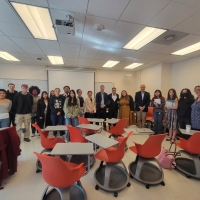News Article by Professor Mahmood Monshipouri
The unwinnable war in Afghanistan: What is left to learn?
Anyone who believes in the success of the long-term occupation of Afghanistan or tilting the balance of power in its favor by military intervention of that country is either naïve, delusional, or downright irresponsible. Several imperial powers have come to terms with this reality: The Persian Empire (539 until 331 BC), Alexander the Great (330 until 327 BC), Great Britain (1839-42), Russia (1980-88), and the United States (2001-2021).
In virtually all these cases, an outside power has failed to impose an alien political system and cultural values upon the Afghanis. Today, there can be little doubt that the Americans have lost the Afghanistan war. American dollars and military power have failed to make an ally of Afghanistan or a stable democratic state in its own right. The Biden administration’s recent decision to disengage from Afghanistan has raised the issue of strategy, expectations, and more importantly, logistics. Twenty years of U.S. military intervention under multiple U.S. administrations, which spent $83 billion on building the Afghan army, have failed to build a reliable fighting and security force—only one whose soldiers had the will to fight. In the end, Afghan security forces were revealed to be hollow as they impotently collapsed in the face of the Taliban assault and occupation of the capital city, Kabul.
The American record of nation building has been abysmal. The United States has hardly been successful at establishing stable or long-lasting democracies in the past: Of the more than dozen democratic nation-building projects undertaken by the United States in the 20th century and beyond, democracy resumed in only few of them—most notably Japan, and Germany—a decade after U.S. forces departed. The experience of Germany and Japan proved to be unique and thus not easily replicable today by any metrics.
From the Bush administration’s democracy promotion to the Trump administration’s push for the Doha Agreement to negotiate with the Taliban, the task of nation-building overseas has presented the U.S. government with serious challenges—not to mention the failure to address the systemic and widespread of corruption in a country gripped with poverty and religious fundamentalism.



